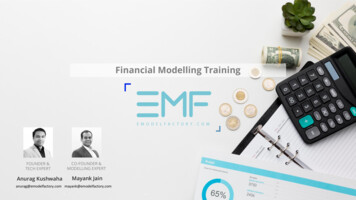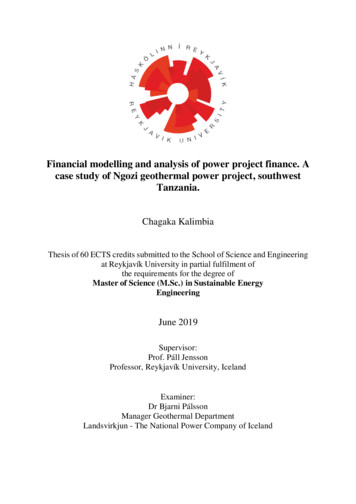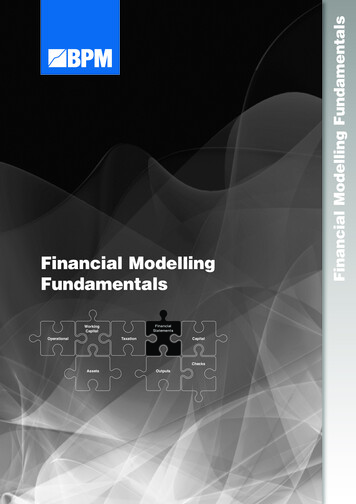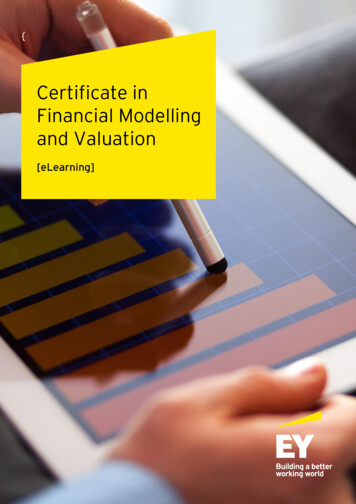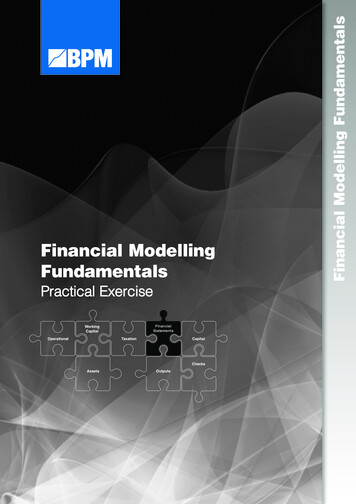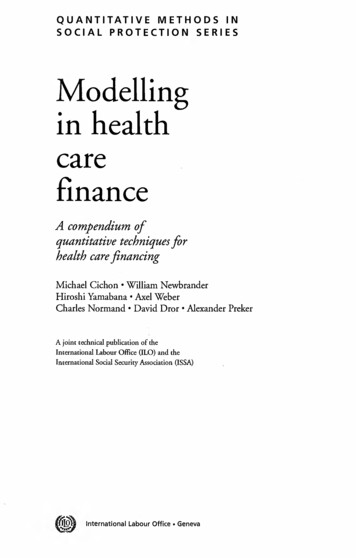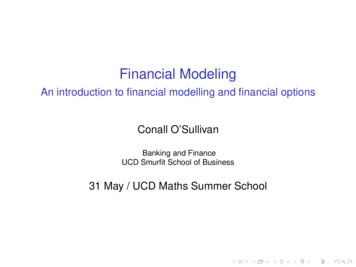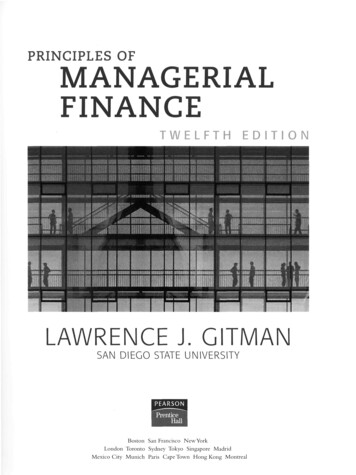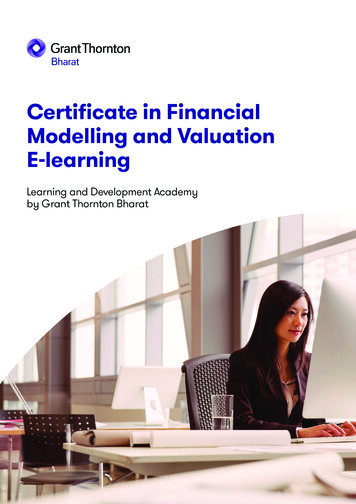
Transcription
SAVE 400Updated 2022 AgendaIf you book3 personsor moreProject Finance &Project FinancialModellingLIVE ONLINE COURSE OVER 8 SESSIONSCommences: 23 June 2022Course Sessions Limited-recourse project financing models & transaction management Project finance documentation management, risk analysis models& Environmental, Social & Governance (ESG) mitigation options Sources of PPP financing: financial products, guarantee instruments, credit enhancements & bankability techniques Designing financial models part 1: Financial model design requirements & work plan management Designing financial models part 2 & 3: Programming financialstatements and interpreting international accounting standards Designing financial models part 4: Project finance model stresstesting, simulation analyses, and modelling for credit enhancements Summary group exercise: Evaluating a financial model for PF riskallocation, transaction closure and post-transaction economicregulation & tariff adjustmentBOOK NOW!Online Course at a GlanceThe online course will bedelivered in 8 live interactivesessions. Each session will be 3hours, including two 5-minutebreaks. The live online courseis powered by Zoom, which canbe accessed via laptops, desktops or mobile devices. Pleaserefer to page 6 for more e-online
Project Finance & Project Financial Modelling (live online course)COURSE OVERVIEWToday’s project finance (PF) transactions require a higher level of expertise not only in programming more sophisticated and flexible financial models, but also in incorporating the latest risk mitigation and credit enhancement instruments. While higher standards of Environmental, Social, and Governance (ESG) impact management are being demanded of all major capital projects worldwide, more options andmodels for ESG mitigation, insurance, guarantee products, and financing instruments are now available. This online course covers both thelatest PF strategies, risk mitigation instruments, as well as financial modelling best practices.The objective of this course is to provide participants with an enhanced understanding of the practical & documentation requirements of allinterested parties to today’s PF transaction. This programme provides you with proven PF analytical strategies and transaction structuringtechniques which will enable you to quantitatively assess risks, resolve constraints, and reach project financial closure. This programme isalso designed to enhance the check lists and benchmark metrics by which you can reduce losses and which will be viewed favourably byboth management and the regulatory community. BENEFITS OF ATTENDINGUnderstand the key practical and transaction management requirements of today’s project finance (PF) marketplaceOversee and direct PF transactions including managing specialist transaction advisorsManage PF documentation requirements and manage detailed lender due diligence requirements to reach commercial & financialclosureDesigning commercial financing instruments, funding products, credit enhancements, and “blended finance” strategies to ensurePF bankabilityThe latest standards for analyzing and mitigating Environmental, Social, and Governance (ESG) impacts of PF transactionsBest practices for resolving practical PF challenges in specific infrastructure and industrial sectors including - renewable energy;power transmission & energy pipelines; logistics & transport facilities; airports, ports, & roads; desalination plants; water &wastewater treatment facilities; accommodation, hospitals & education facilities; commercial real estate, agro-industrial facilities;mining & natural resources, etc.Practical standards for designing & programming financial models for PF transactions, data assumptions, financial statements,international accounting standards, and bankability metricsReview and critique PF financial models prepared by specialist PF financial advisorsStress-test PF models: sensitivity analysis, scenario analysis, and simulation analysis techniquesUse PF financial models to guide risk-allocations, credit enhancements instruments, bankability measures, and reach transactionfinancial closureYOUR EXPERT COURSE DIRECTOREdward is an international Project Finance & Infrastructure Financing specialist with over 30 years of extensiveexperience in 60 countries in designing PF strategies & framework, infrastructure project finance, PPP feasibilitystudies and transaction advisory services. He has directed and structured financing plans for over 850 millionworth of investments in the energy and other infrastructure sectors. He has worked on renewable energy investment transactions and advisory assignments throughout South East Asia, South Asia, Eastern Europe andAfrica. He has designed and led executives training programs on energy investment transactions for over 12,000officials worldwide.COURSE METHODOLOGYCOURSE CERTIFICATEThis online workshop features rigorous new interactive methodologythat require attendees to demonstrate their understanding with eachmodule’s practical techniques and learning outcomes. Every 10-15 minutes throughout each session, you will be required to complete eitherfocused review questions for selecting among a range of PF transactionmanagement decisions. You should be prepared to actively participate,and not merely to “watch & listen” video presentations.Upon the successful completion of this course,you will receive a Certificate of Attendance totestify your endeavour and serve towards yourprofessional advancement.Case studies of PF transactions will feature the real-world details of PFInfo memos, feasibility studies, impact assessments, and PF agreementsto provide first-hand understanding of the challenges of PF transactions.Discussions will place you into the practical roles of key managementdecision-makers who not only need to analyze and understand PF investment proposals, but who have to make real-world decisions on transactions. As a result of actively engaging in this program’s methodology, youwill be able to make practical decisions on PF strategies, projects, andtransactions for your organizations following the workshop’s completion.IN HOUSE TRAINING (Save up to 40%)Interested in this course for a group of at least15 people? Contact Ms. Jessie Ang on 65 63250211 or email jessie@infocusinternational.comPROGRAMME SCHEDULE (GMT 0)Applicable to all 8 sessions12:0013:00 -13:0514:00-14:0515:00Session startsFirst breakSecond breakEnd of -online
Online Course AgendaSESSION 1 23 June 2022, 12pm – 3pm GMTTHE ADVANTAGES OFLIVE ONLINE LEARNINGUntil now if you wanted to experienceone of Infocus International's world leading courses, you would either have totravel to the training location, or yourorganisation would sponsor an in-housetraining programme. Now, regardlessof your geographical location, you canexperience the same level of quality asa public or in-house course and learnfrom office, home or even on the move.There’s also the huge savings of cost andtime by not having to travel to the training location.We all face more pressure in our business lives. Finding time to attend coursescan prove very difficult and plans are toooften put aside. If you’ve had to put training on the back burner due to other commitments, our online learning course iswhat you’ve been waiting for.Through live online learning you can enjoy the full benefits whilst minimisingdisruption to your professional commitments. The course is accessed online,giving you the flexibility and freedom toparticipate from anywhere in the worldas long as internet access is available.If you miss out a session or two, youcan access the playback video recordingavailable up to a week after the live session.ABOUT THE ORGANISERInfocus International is a global businessintelligence provider of strategic information and professional services. Weprovide worldwide participants withintensive technical training programmesdesigned to help them succeed on theglobal stage.Our ever-expanding portfolio of face-toface courses, conferences, and live onlinecourses range in complexity from introductory programmes for new marketentrants, through to the most complexsubjects in the industry.Book 3 persons and save 400 eachLimited-Recourse Project Financing Models & TransactionManagementSpecial requirements of today's limited-recourse project finance transactions Unique investment requirements of infrastructure & capital projects: economies of scale, financing terms, demand stability & risks, fixed-costs and revenuerequirements, ESG measures & impact mitigation, and stakeholder managementchallenges Infrastructure & capital project financing strategies: sovereign finance vs.corporate finance vs. limited-recourse project finance The “Security Package” of project finance agreements Project finance contracting modalities: BOO, BOOT, BOT, DBFO, DBO, etc. Application of project finance to different sectors – energy & renewables,transportation, logistics, digital infrastructure, environmental facilities, hospitals,education, accommodation & housing, etc.SPV and its requirements for bankable project finance Why the SPV? Ownership structures Significance of the financial model Project finance as a security package of inter-related contracts Optimum management of PF risks through the SPV structurePF Transaction Case Study: Bujagali Falls Hydroelectric Dam Project Financing,UgandaKey financial analysis measures for PF bankability & creditworthiness Debt Service Coverage Ratio (DSCR) & Interest Coverage Ratio (ICR) Internal Rates of Return (IRR): Equity IRR, Project IRR, Modified IRR (MIRR),& XIRR Degree of Operating Leverage (DOL) & fixed-cost benchmarksPF deal origination & transaction stakeholder management requirements Project financing identification options & investment project concept notes Unsolicited Proposal (USP) & Privately-Initiated Investment Proposals (PIIP)development options & challenges PF stakeholder mapping, management, and policy context evaluation techniquesConstructing the PF feasibility study & investment business case Hiring & overseeing specialist PF consultants: model terms of reference & qualityreview requirements Financial feasibility modelling design, confirming input assumptions, and financial instruments Environmental, social, and governance (ESG) impact analysis standards andmitigation models Risk identification, analysis, and allocation models and credit enhancementtechniques Project finance bankability, affordability & business case designReaching PF transaction closures: commercial closure vs. financial closure Terms of Reference (ToR) models for procurement & tendering/PPP proposaltransaction advisors Designing & responding to competitive tenders for PF and PPP transactions PPP bid stipend options: affordability & requirements Managing PF contract negotiations & reaching transaction commercial closure Lender due diligence requirements & managements-- Lender deal origination and PF term sheets-- Underwriting commitments & PF structuring-- PF loan syndication procedures Practical requirements & management techniques for reaching PF transactionfinancial closure 65 6325 0211
Project Finance & Project Financial ModellingSESSION 2 27 June 2022, 12pm – 3pm GMTPF Documentation Management, RiskAnalysis Models & ESG Mitigation OptionsPF contracts & key transaction documentation requirements The “security package” of key PF contracts and their interrelationships-- EPC/Turnkey contracts-- Shareholder/Investment agreements-- PF Lending agreements-- Lenders’ direct agreements & step-in rights-- Insurance & Partial Risk Guarantee (PRG) contracts-- Input supply-- Government letters of support and off-taker financialperformance guarantees-- Escrow agreements, agents, documentation requirements, and pay-out conditions Key contract issues: liquidated damages, performancebonds and retentions, completion guarantees Intercreditor agreements and common trust securityagreementsTransaction Case Study: Victoria Desalination Plant ProjectFinancing, Victoria, AustraliaPF risk analysis standards and models The role of the PF financial model Risk identification, “heirarchization” & prioritization models Project risk impact assessment & risk probability techniques Stress-testing: risk sensitivity analyses & scenario analysesPF risk management & mitigation strategies Lending agreement applications (e.g. step-in rights) Management effectiveness Technology limitation and warranties Derivatives and their use in project finance-- Hedging strategies using derivatives-- Structured finance solutions-- Commodity derivatives Examples of risks and their management in project finance Dispute resolution and arbitration techniquesInteractive Group Exercise: Structuring a PF Transaction &Reaching Financial ClosureSESSION 3 28 June 2022, 12pm – 3pm GMTSources of PPP Financing: FinancialProducts, Guarantee Instruments, CreditEnhancements & Bankability TechniquesPF instruments & financial products: requirements,opportunities and challenges Financing choices between equity and debt – the cost ofcapital debate Equity, equity bridge loans and subordinated shareholderdebt – the sponsor perspective Export credit finance instruments, products, requirements,advantages & disadvantages Multilateral agencies and development finance institutions:risk mitigation, reputation & “crowding-in” opportunities 65 6325 0211 Bank lending criteria (tenor, rates, ratios such as loan lifecover, project life cover, and DSCR ratios) Cashflow waterfall – tax, operations, reserve accounts,inter-creditor issues and dividends Third party investment in project finance deals andapplicability of valuation techniques Bond issues, securitisation, and security requirements Credit rating agency PF methodologies, rating considerations and examples Evaluating local vs international financing optionsDealing with “sovereign ceilings”, financing instruments &guarantee products for bankable PF The role and track record of the multinational agencies &international financial institutions: The World Bank/IFC,ADB, AfDB, IsDB, EBRD/IAB, IADB Credit enhancement instruments offered by export creditguarantee agencies for PFTransaction Case Study: As-Samra Wastewater TreatmentPlant Phase 1 & Phase 2 Project Financing, JordanPF credit enhancement options & refinancing techniques “Blended Finance” techniques & structuring public capitalcontributions & disbursement conditions for PF Viability Gap Funds (VGF): Fund designs, evaluationmethods, and fund draw-down management Measuring availability payments & capacity payments &analyzing off-taker fiscal affordability Formulas & index-inputs for calculating capacity &volumetric payments Calculating Minimum Revenue Guarantees (MRGs) Designing & valuing PF debt service reserve accounts Payment assurance schemes & off-taker reserve accountmodels Subordinated debt, “mezzanine financing,” and covenants PF revenue enhancement options: co-generation, realestate development rights, risks & opportunities Deferred principal debt structuring options & pricingmethods Analyzing PF refinancing opportunities & requirements Due diligence, documentation requirements, andnegotiating management techniques for refinancing PFtransactionsSESSION 4 29 June 2022, 12pm – 3pm GMTDesigning Financial Models Part 1:Financial Model Design Requirements &Work Plan ManagementDesigning effective PF financial models Establish the foundation: understand PF model objectivesfor the transaction decision-making process PF modelling standards for different phases: pre-feasibilitystudy; feasibility study; private bid; lender due diligence;and post-transaction payment / tariff regulation &refinancing Evaluating all key PF stakeholders and what the specificfinancial model outputs required for project bankability,affordability, and sustainabilityjessie@infocusinternational.com
Project Finance & Project Financial Modelling Key PF model outputs: DSCR, Equity IRR, Project IRR,MIRR/XIRR, NPV, Degree of Operating Leverage (DOL) &fixed vs. variable costs Key PF model financial input assumptions: gearing ratios& capital structures, investor discount rates & WeightedAverage Cost of Capital (WACC), debt terms & tenors Mapping-out key PF financial model components &worksheets: “dashboards” and “inputs & results”; capitalexpenditures & construction cost estimates; financing &loan repayment tables; P&L statements; cash flow statements; & proforma balance sheets Managing key PF data-gathering tasks, credibility &verification standards, and PF financial model workplansPractical management of PF data-gathering & inputassumption requirements Capital expenditure cost estimation, quantity surveying &International Property Measurement Standards (IPMS),AACE cost estimation classification system for construction& engineering, estimate review & credibility standards,requirements, and management techniques Equipment Renewal & Replacement (R&R) standards,asset depreciation schedules & Original EquipmentManufacturer (OEM) maintenance standardsInteractive Group Exercise: Designing a PF Financial Model– Identifying Key PF Outputs and Data-Gathering Requirements30 June 2022, 12pm – 3pmSESSION 5 & 6 5 July 2022, 12pm – 3pmDesigning Financial Models Parts 2 & 3:Programming Financial Statements andInterpreting International AccountingStandardsPF model formatting & presentation standards for ease-ofunderstanding & clear decision-making PF model clarity for specific decision-making by key stakeholders for bankability, affordability, & sustainability Formatting & labelling standards for MS Excel and spreadsheet PF models Model formulas and PF model auditing processes & footnoting input assumption sources Presenting which PF model assumptions can be changedin the model and which cannot Using graphs for presenting key PF model outputs & cashflows, etc. to support stakeholder decision-makingDesigning PF model “dash boards” & “inputs & results”worksheets Deciding which key PF input assumptions to allow to varyand display in the “Dash Board” Selecting key PF model outputs to display for transactiondecision-makers PF bankability, affordability, and sustainabilityincorporating “blended financing” & VGF options Programming debt terms, tenors, and other lendingrequirement assumptions Calculating interest & principal payments & presentingdebt payment tablesThe PF profit & loss statement & the cash flow statement Determine the project’s specific revenue structure &demand/capacity utilization risks Linking O&M costs to equipment, technology & capexestimates Inflation-indexed costs: labour price index, energy & fuel,and producer price index Depreciation options for project assets & equipment andother allowable deductions from local tax codes Programming for taxation: VAT, corporate & other localtaxes Net income and computing profitability ratios: Return onEquity (RoE), Return on Assets (RoA), operating margin &net profit margin, etc. Programming the PF statement of cash flows: cash flowsfrom operations, from investment activities, & fromfinancing activitiesProgramming proforma balance sheets Setting-up current vs. long-term assets and current vs.long-term liabilities Key components and line-items for PF balance sheets Accounting for reserve accounts in proforma PF balancesheets Key PF balance sheet ratios: solvency, debt / equity,turnover, etcDesigning other supporting PF model worksheets Revenue worksheets for differing capacity factors, multipleclasses of customers & differing pricing blocs of consumption Depreciation worksheets for multiple equipment classes &maintaining project asset registries O&M costs for different assets, rates of asset utilization,and inflation PF taxation worksheets Summary graphs of PF cash flows, and key model outputsfor transaction decision-makersAccommodating different accounting standards & currencyissues General requirements and differences between majoraccounting standards: GAAP, IAS & local/national accounting standards & tax codes Taxation and depreciation requirements of internationalvs. local tax codes and accounting standards Programming techniques for foreign exchange related risks& impacts on long-term project financingsDesigning PF capital expenditure worksheetsReviewing, trouble-shooting, and auditing PF models Standards for reviewing, revising, & auditing PF models Current PF standards in developing single, common, andindependently-audited government, lender & investorendorsed PF models Terms of Reference (ToR) and standards for hiring andoverseeing independent PF model auditorsDeveloping the financing worksheet PF gearing ratio assumptions, debt, equity sources &Interactive Group Exercise – Part 2: Reviewing, Critiquing &Stress-Testing a PF Financial ModelBook 3 persons and save 400 each 65 6325 0211
Online Course AgendaSESSION 7 6 July 2022, 12pm – 3pm GMTDesigning Financial Models Part 4:PF Model Stress-Testing, Simulation Analyses, and Modelling for Credit EnhancementsPF model outputs for bankability, creditworthiness, affordability, and sustainability DSCR & interest coverage IRRs: project IRR, equity IRR & MIRR Liquidity, solvency, and reserves analysis Fiscal space analysis for projected PF availability & volumetric payments Valuation options for public sector guarantees and contingent liabilities for PPPs PF model outputs for ensuring ESG impact mitigation, remediation, and localsustainabilityManaging PF model stress-testing, sensitivity analysis, auditing & simulations Programming sensitivity analysis for PF model bankability & creditworthiness Input data gathering, assessment, and variability assumptions Setting up scenario analyses for PF options evaluation Checklists and Terms of Reference (ToR) for PF model auditors Requirements, assumptions, and procedures of PF simulation analysesSESSION 8 7 July 2022, 12pm – 3pm GMTSummary Interactive Group ExerciseInteractive Group Exercise: Evaluating a PF Financial Model for PF Risk Allocation, Transaction Closure and Post-Transaction Economic Regulation & TariffAdjustmentWHAT EQUIPMENT DO I NEED? A laptop / desktop PC / Tablet / Mobile PhoneInternet connection – wired orwireless broadbandSpeaker and microphoneWebcamHOW DOES IT WORK?A unique meeting ID and password willbe provided to the participants to enterZoom virtual meeting room and to takepart in the interactive live course. Youcan choose to download the Zoom software, or simply access via web browser.Ask live questions or utilise Chat featureto interact with the trainer and fellowparticipants. You can also use Whiteboard and Screen Sharing features.Just like in a physical workshop, Whiteboard allows trainer and all participantsto write on a blank screen for everyone to see. Our event coordinator willbe there to guide you if you need anyassistance.WHAT IF I MISSED A SESSION?Participants who miss a session may contact our dedicated course coordinatorto request the video recording, whichis available up to one week after eachsession. Note that the video will not bedownloadable.WHO WILL BENEFIT?Directors / Managers / Executives of: Finance Business Development Project Development Project Finance Commercial Investment Planning & StrategyFrom all sectors, including but not limited to: Energy Mining Water & Waste Treatment Financial Institutions Government Authorities Infrastructure Transportation Healthcare Housing Commerce and e-online
Event Code:EventCode:120610DB220623OCProject Finance &Project Financial ModellingLIVE ONLINE COURSE OVER 8 SESSIONSCommences: 23 June 2022DELEGATE DETAILS1Full Name Mr/MsREGISTRATION FORMRegistration & EnquiriesInfocus International Group Pte Ltd143 Cecil Street #25-02, Singapore 069542Contact : Ms. Jessie Ang: (65) 6325 0211TelMain : (65) 6325 0210: (65) 6224 5090FaxEmail : jessie@infocusinternational.comWeb : infocusinternational.com/projectfinance-onlineJob TitleTel/MobYOUR INVESTMENTEmail2For 1 or 2 personsFor 3 persons or moreUSD 3,450USD 3,050Full Name Mr/MsFEE PER PERSONJob TitleTel/MobPAYMENT METHODEmail3Payment is required within 5 working days upon receipt of invoice.q By Credit Card: q VISA q MasterCard q American ExpressFull Name Mr/MsNote that the credit card will be charged in Singapore Dollar currency (SGD).We will quote the SGD amount and send credit card payment instruction priorto the charge.Job TitleTel/Mobq By Telegraphic Transfer (USD)Email4Account name: Infocus International Group Pte LtdAccount number (USD): 017–025866–1Swift code: SCBLSG22Bank name: Standard Chartered BankBank address: 6 Battery Road, #01-01, Singapore 049909Full Name Mr/MsJob TitleTel/MobOTHER ONLINE COURSESEmail5Public Private PartnershipESG & Sustainable FinanceRenewable Power Finance for Non-Finance ProfessionalsRenewable Energy Project Finance & Financial ModellingFull Name Mr/MsJob ursesEmail6Full Name Mr/MsCANCELLATION POLICYJob TitleShould you be unable to attend, a substitute delegate is welcome at no extracharge. If this is not suitable, cancellations must be made in writing (letter or fax)at least 30 days before the program commences. A full refund less an administration charge of 10% will be given. Registrations cancelled less than 30 days beforethe event must be paid in full and a credit voucher equivalent to the full amountwill be issued for you to attend any Infocus International Group events for up to18 months. Credit vouchers will not be issued for no-shows without cancellation.Infocus International Group will provide full course documentation to a delegatewho has paid, but is unable to attend. Infocus International Group reserves theright to change the content of the program without notice including the substitution, alteration or cancellation of speakers and/or topics and/or the alteration ofthe dates of the event. Infocus International Group is not responsible for any lossor damage as a result of a substitution, alternation, postponement or cancellationof an event under any circumstances.Tel/MobEmailORGANISATION DETAILSCompanyAddressAUTHORISATIONFull Name Mr/MsJob TitleEmailSignature
Project Financial Modelling Commences: 7 February 2022 Cour imited-recourse project nancin models transaction manae-ment Wroject nance documentation manaement risk analsis models nvironmental ocial overnance mitiation options ources of nancin nancial products uaran
